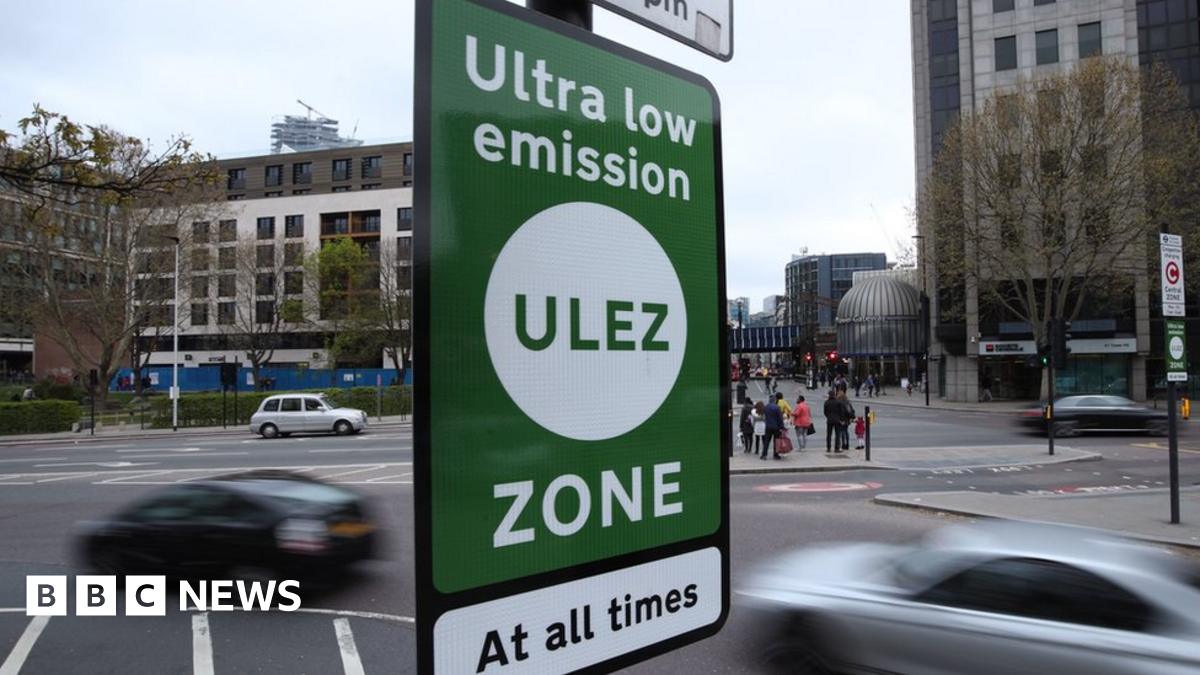From 29 August 2023, the ULEZ will be expanded to cover whole of Greater London.

 www.bbc.co.uk
www.bbc.co.uk

ULEZ: Ultra Low Emissions Zone to cover all of London
From August, drivers of the most polluting cars will have to pay £12.50 to enter Greater London.
London's Ultra Low Emissions Zone (ULEZ) is to be expanded to cover all of London, the mayor has announced, despite "overwhelming" opposition.
From 29 August, drivers of the most polluting cars will have to pay £12.50 a day to enter to the Greater London Authority boundary.
A public consultation found 80% of people in the affected areas were opposed the expansion of the zone.
But Sadiq Khan says five million more people will benefit from cleaner air.
"The ULEZ so far has been transformational, reducing harmful pollution levels by almost a half in central London," Mr Khan said.
"But there is still far too much toxic air pollution permanently damaging the health of young Londoners and leading to thousands of early deaths every year, with the greatest number of deaths in the outer London boroughs."
Under the scheme, which was introduced in 2019, drivers are charged to enter the area within London's north and south-circular orbital roads but the charge is not applied across the capital.
People with non-compliant cars who live in the ULEZ are not exempt from daily charges.
The mayor's office believes about 200,000 non-compliant vehicles are driven regularly in London, a figure it expects to fall rapidly.
Some 60% of those who responded to the public consultation into the expansion plans were opposed to it, with 70% of residents in Outer London against the idea, and 80% of workers in Outer London opposed.
The Greater London Authority (GLA) Conservatives described the opposition as "overwhelming" and "staggering" and criticised the mayor for pushing ahead with the plans despite the public response.
The Conservatives' transport spokesman Nick Rogers spoke out against the timing of the plans.
"Now is not the time to hammer Londoners with a £12.50 daily cost-of-living charge. Residents have made their views very clear to the mayor: they do not want the ULEZ expansion. The mayor must listen to them, scrap these plans and use the £250m saved on real measures that tackle air pollution".
Some MPs in Outer London have pointed out that public transport is not as reliable or efficient there as in other parts of the capital.
Mr Khan said the cost of living had been a "key consideration" for him, adding that plans were in place to relieve the effect on drivers.
He said that expanding the ULEZ London-wide had "not been an easy decision" but that "in the end, public health comes before political expediency".
There will be an increased scrappage scheme fund of £110m and those who scrap more polluting cars will also be offered travelcards. Under the plans, disabled drivers will be entitled to a grace period until 2027.
City Hall also said bus networks would be improved in Outer London.
The Federation of Small Businesses, which has opposed any ULEZ expansion, believes many of its members in Outer London will be badly hit.
Among them is Linda Quayle, who owns and runs a bridal shop in Bexley Village, which will fall inside the expanded ULEZ.
"It's going to be a nightmare," she told BBC London.
"Most of my customers drive and adding in this ULEZ charge, they're just not going to bother.
"There's no way around it to get to me," she said. "I survived lockdown, this is the last thing I need now."
Rosamund Adoo-Kissi-Debrah, a clean-air campaigner from south London, described the expansion as a "big step in the right direction".
Last year, a coroner ruled Ms Adoo-Kissi-Debrah's nine-year-old daughter Ella died partly due to the effects of pollution near their Lewisham home.
"When we had the inquest, we got the experts in Ella's case to give some recommendations and all of them agreed ULEZ expansion was something that needed to be done to clean up the air in London," she said.
However, a recent TfL report found the zone had had a limited effect on pollution levels, and some motoring groups have said they believe it unfairly penalises drivers.
The Alliance of British Drivers believes Mr Khan has exaggerated the public health benefits of the scheme.
"His whole basis for extending the ULEZ zone on the basis of public health doesn't stand up to scientific scrutiny," policy director Brian Gregory said.
"TfL (Transport for London) has an enormous hole in its budget and Mayor Khan is looking to fill that hole by any means that he can."
Mr Gregory added he believed that some campaigners might pursue legal avenues to try to stop the plans.
"I think Mr Khan could quite conceivably find he has legal challenges heading his way," he said.

Analysis
By Tom Edwards, BBC London transport and environment correspondent
They call it the ULEX (ULEZ extension) - and the plan is London will get the expanded ultra-low emission zone on 29 August 2023.
With this further expansion, the noise against it has been much louder and clearer - many groups have called for it to be delayed.
Outer London is more car-dependent and there is much less public transport.
But the mayor thinks doing nothing is not an option.
This time there seems to be more mitigation.
Although the details aren't clear yet, the scrappage scheme - where you get money to scrap your old car - will be bigger.
City Hall will also give you a travelcard as part of that and disabled drivers will have until 2027 to comply.
The big question politically is: has the mayor overreached? Or is this a brave, radical policy that will ultimately save lives?

